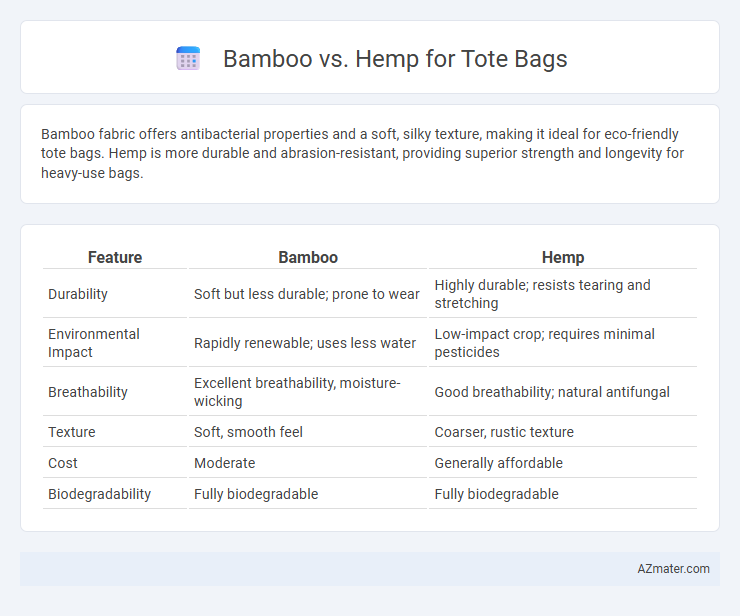Bamboo fabric offers antibacterial properties and a soft, silky texture, making it ideal for eco-friendly tote bags. Hemp is more durable and abrasion-resistant, providing superior strength and longevity for heavy-use bags.
Table of Comparison
| Feature | Bamboo | Hemp |
|---|---|---|
| Durability | Soft but less durable; prone to wear | Highly durable; resists tearing and stretching |
| Environmental Impact | Rapidly renewable; uses less water | Low-impact crop; requires minimal pesticides |
| Breathability | Excellent breathability, moisture-wicking | Good breathability; natural antifungal |
| Texture | Soft, smooth feel | Coarser, rustic texture |
| Cost | Moderate | Generally affordable |
| Biodegradability | Fully biodegradable | Fully biodegradable |
Introduction to Natural Fiber Tote Bags
Natural fiber tote bags crafted from bamboo and hemp offer eco-friendly alternatives to synthetic materials, combining durability with sustainability. Bamboo fibers provide a soft texture and natural antibacterial properties, while hemp fibers are known for their exceptional strength and resistance to wear. Choosing between bamboo and hemp depends on preferences for softness versus robustness in reusable tote bags designed for everyday use.
Overview of Bamboo and Hemp Fibers
Bamboo fibers are derived from the pulp of bamboo plants, offering natural antibacterial properties, softness, and durability, making them ideal for eco-friendly tote bags. Hemp fibers come from the stalks of the hemp plant, known for their exceptional strength, breathability, and resistance to wear, providing long-lasting performance in tote bags. Both fibers are biodegradable and sustainable, but hemp typically has a lower environmental impact due to less water and pesticide use during cultivation.
Sustainability Comparison: Bamboo vs Hemp
Hemp outperforms bamboo in sustainability for tote bags due to its faster growth rate, requiring minimal water and no pesticides, which significantly reduces environmental impact. Bamboo cultivation often involves intensive harvesting methods and chemical treatments that can harm ecosystems despite its rapid growth. Hemp's ability to regenerate soil and absorb carbon dioxide makes it a superior eco-friendly choice for durable, sustainable tote bags.
Durability and Strength of Bamboo and Hemp Bags
Hemp tote bags offer superior durability due to their long, strong fibers, making them highly resistant to wear and tear over time. Bamboo fabric, while softer and more eco-friendly, tends to be less resilient under heavy loads compared to hemp. For heavy-duty use, hemp bags provide greater strength and longevity, ensuring reliable performance in everyday activities.
Environmental Impact of Bamboo Cultivation
Bamboo cultivation for tote bags offers significant environmental benefits due to its rapid growth rate and ability to sequester carbon efficiently, making it a highly renewable resource. Unlike traditional crops, bamboo requires minimal pesticides and fertilizers, reducing soil and water pollution. However, large-scale bamboo farming can lead to habitat loss if not managed sustainably, highlighting the importance of responsible cultivation practices.
Eco-Friendliness of Hemp Production
Hemp production significantly outshines bamboo in eco-friendliness due to its low water requirements and minimal need for pesticides or herbicides. Hemp plants absorb more CO2 per hectare annually compared to many other crops, contributing to effective carbon sequestration. Moreover, hemp's fast growth cycle and ability to revitalize soil quality make it a sustainable choice for tote bag manufacturing.
Comfort and Texture Differences
Bamboo tote bags offer a silky, smooth texture that feels soft against the skin, making them highly comfortable to carry for extended periods. Hemp tote bags, on the other hand, feature a coarser, more rugged texture that provides durability and a natural grip but may feel rougher on sensitive skin. The breathability of bamboo fibers enhances moisture-wicking properties, whereas hemp fibers contribute to a sturdier structure ideal for heavy loads.
Cost Analysis: Bamboo vs Hemp Tote Bags
Bamboo tote bags generally have a lower production cost due to faster growth rates and higher yields per acre compared to hemp, making them more affordable for manufacturers. Hemp tote bags, while slightly more expensive, offer greater durability and longevity, which can justify the higher initial investment over time. Price variations also depend on factors such as processing methods, geographic sourcing, and certification standards within the sustainable textile market.
Style and Design Versatility
Bamboo tote bags offer a sleek, natural aesthetic with a smooth texture that complements minimalist and eco-chic styles, making them perfect for casual or sophisticated looks. Hemp tote bags feature a rugged, textured appearance with earthy tones, providing a versatile design that suits bohemian, rustic, and urban fashion trends. Both materials allow for diverse printing and customization options, enhancing their appeal for personalized, stylish accessories.
Final Verdict: Which Tote Bag is Better?
Bamboo tote bags excel in softness, natural antibacterial properties, and eco-friendliness due to sustainable bamboo cultivation, making them ideal for sensitive skin and everyday use. Hemp tote bags offer superior durability, resistance to wear and tear, and require minimal water and pesticides, positioning them as the best choice for heavy-duty carrying and environmental sustainability. Considering longevity, environmental impact, and functionality, hemp tote bags generally provide the better overall value for both consumers and the planet.

Infographic: Bamboo vs Hemp for Tote Bag
 azmater.com
azmater.com